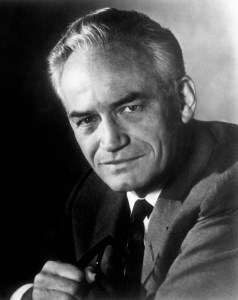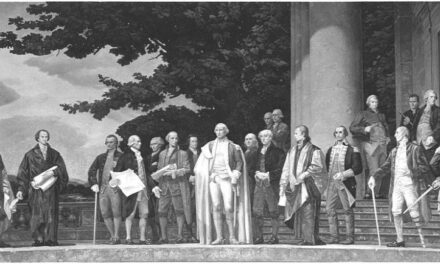We support our Publishers and Content Creators. You can view this story on their website by CLICKING HERE.
What’s rarely remembered about Barry Goldwater is how deeply influenced he was by the founder of post-war conservatism, Russell Kirk.
 I will admit, it’s hard for me to believe that Barry Goldwater ran for the presidency sixty years ago. Sixty years ago! I was born three years later, but I grew up in a very pro-Goldwater household, and there was always a bit of a mystique around him as a person, as a candidate, and as a statesman. He was, of course, trounced in the presidential election, beaten by none other than his fellow senator, a consummate politician, Texan Lyndon B. Johnson.
I will admit, it’s hard for me to believe that Barry Goldwater ran for the presidency sixty years ago. Sixty years ago! I was born three years later, but I grew up in a very pro-Goldwater household, and there was always a bit of a mystique around him as a person, as a candidate, and as a statesman. He was, of course, trounced in the presidential election, beaten by none other than his fellow senator, a consummate politician, Texan Lyndon B. Johnson.
Still, Goldwater ran a mighty campaign, known for its honesty and integrity, and many of the ideas set in motion in 1964 found their fulfillment in 1980 and 1984.
What’s rarely remembered about Goldwater, though, is how deeply influenced he was by the founder of post-war conservatism, Russell Kirk. In a private letter to Kirk in 1984, Goldwater wrote: “It was you and our equal friend, Brother [Jay Gordon] Hall, that really instilled in me the desire to fight for conservatism. You presented me with logical, intelligent reasons for some of my inborn, basic beliefs.” In a 1965 retrospective of the previous year’s campaign, Goldwater’s campaign manager admitted the same, noting “Kirk, a disciple of the English [sic] political philosopher Edmund Burke, helped Goldwater to articulate his instinctive, intuitive support of conservative principles.”
In his 1988 autobiography, co-authored with Jack Casserly, Goldwater explained in detail just how important both Friedrich Hayek and Russell Kirk were to him:
One of the enjoyable aspects of being a Republican, from the time I entered the Senate in 1953 to today, has been the fact that the conservative moment has constantly expanded its intellectual base. During my early years in the Senate, I was much influenced by the work of Professor F.A. Hayek, author of The Road to Serfdom. Russell Kirk’s The Conservative Mind, published the year I entered the Senate was also important to me. Kirk gave the conservative viewpoint an intellectual foundation and respectability it had attained in modern society. He assailed the planning mentality of the time. Kirk rightly said it undermined the role of the family and community. He declared that religion, family, and private property and its yield, as well as law and order, were the foundations of a conservative society. Kirk emphasized that social planning reduced the preeminence of the family and community. He also saw such planning as undercutting the rightful role of religion in attempting to solve many human problems. It substituted a humanistic, impermanent set of rules and aims that would, inevitably, make society unstable.
It should be noted that Kirk equally admired Goldwater, not only writing two major speeches for him but also promoting the Arizonan frequently in his syndicated newspaper column, “To the Point,” and in National Review.
In the latter, Kirk wrote a significant piece in 1963 entitled, “The Mind of Barry Goldwater.” The article is well worth remembering.
[Goldwater] forms his practical judgments chiefly upon the basis of conversations with men who, he has reason to believe, know what they are talking about. And in this he has a curious power of rapid penetration. Conceivably he possesses an hereditary talent for shrewd measurement of men: certainly those successful merchants, his father and his grandfather, were accomplished in this art. In a few minutes of talk, he grips the heart of the matter under discussion—and doesn’t forget. Interwoven with this gift for assimilating the essence of an oral exchange is still more remarkable, Goldwater knack of apprehension which must be called intuition. Accustomed to decide at short notice, he seems able to leap mentally, in the course of a conversation, from premise to conclusion, even though the particular ground maybe unfamiliar to him. He knows how to think—which in anyone, and especially in a modern President, matters much more than an accumulation of inert facts.
Further,
Mr. Goldwater has a mind calculated to distinguish tellingly between the able lieutenant and the pretentious subordinate. He has a mind calculated to anticipate difficulties and make preparations for them. He has a mind calculated to arrive at hard decisions without dangerous vacillation. He has a mind calculated to reconcile necessary improvement with the essential continuity of institution and purpose. He has a mind calculated to withstand the ideologue’s bullying, without himself indulging in rant and rodomotade. He has a mind rooted in principle and tradition, but enlivened by a love of action, and humanized by humor.
Admittedly, I had to look up the word “rodomotade” [it means boastful behavior], and I’m guessing it was only infrequently employed during the Goldwater era. Leave it to Kirk, however, to use such a term and make us all better for it.
Even after Goldwater proved incredibly libertarian on social issues, Kirk remembered the early 1960s and his work with the senator fondly. In his autobiography, The Sword of Imagination, Kirk recalled:
This book not being a political history of the United States in the latter half of the twentieth century, only a very succinct description of Senator Goldwater and his convictions follows. In 1961, Goldwater was fifty-two years old and had been in the Senate since 1952; there he had set his face against liberalism, including Republican liberalism. No politician ever was more likeable, or more candid.
Whatever Goldwater’s faults, he was deeply honest. So was Kirk. I would give much, sixty years later, for such an alliance in the current morass that passes for normal in today’s politicized and partisan American culture.
The Imaginative Conservative applies the principle of appreciation to the discussion of culture and politics—we approach dialogue with magnanimity rather than with mere civility. Will you help us remain a refreshing oasis in the increasingly contentious arena of modern discourse? Please consider donating now.
The featured image is a photograph of Arizona Senator Barry Goldwater in 1960, and is in the public domain, courtesy of Wikimedia Commons.
Share This Story, Choose Your Platform!
Go to Top

 Conservative
Conservative  Search
Search Trending
Trending Current News
Current News 






